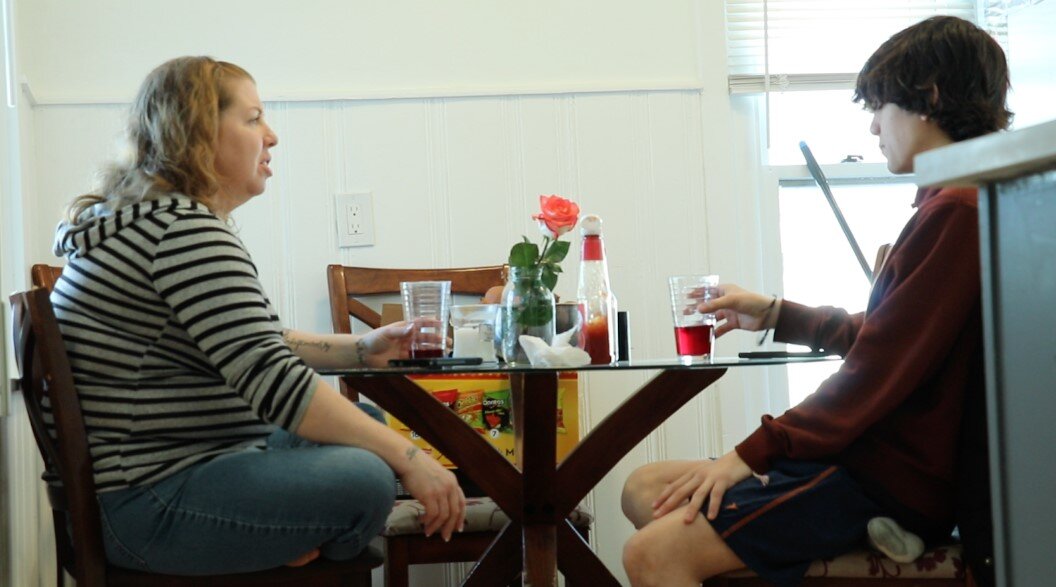'When you're doing right, the right things happen': A woman's journey from addict to caregiver

DENVER — The first time Melissa Cullen smoked marijuana, she was 12 years old.
She crossed the bridge by her school with some friends to buy marijuana after class. The numbing sensation was comforting; it made her feel like nothing mattered. Weed and alcohol quickly devolved into “every drug under the sun,” including cocaine, methamphetamine, and heroin. The initial thrill of smoking with friends became a decades-long addiction which would cost Cullen her kids and her freedom.
Looking back, Cullen is struck by how naturally she fit her addiction into her life. “It was all so normal to me,” she said. “Get up, get high, take my kids to school.”
Over 23 years would pass before she decided to get clean.
The National Survey on Drug Use and Health found that 43.6 million Americans had a substance use disorder in 2021. Another study found that 46% of American adults have a friend or family member who is addicted to substances.
Today, Cullen is 42. She owns her own cleaning business, Cullen’s Cleaning, and cooks and cleans at Colorado Coalition for the Homeless. She used to work at Cafe 180, a sliding scale cafe on South Broadway designed to bring Denverites together regardless of class.
Cullen lives with her two kids, her dogs and her partner in a cerulean blue house in South Denver. She decorated the front yard with pink and purple hearts for Valentine’s Day. Her dogs “sing” in the backyard, their howls harmonizing with the hectic activity inside the house. Cullen has been clean for three and a half years.
A normalized addiction
“The first and most important thing [about recovery], and the thing that most people don’t understand, is that no addict gets clean unless they want to,” Cullen explained. Growing up with her father, who was also an addict, she learned to normalize addiction, seeing it as a natural part of her day-to-day life. She remembers, even in the depths of addiction, always going to the dentist and taking care of herself because she still saw her situation as normal.
Over time, getting high became the only way Cullen knew to deal with life. When a friend died from an overdose, she got high. When social services took her kids for the second time, she got high.
“You get stuck,” she said. “It seems like the only thing you have, and eventually it is the only thing you have because you’ve allowed it to take everything else.”
Cullen’s revelation came to her in the waiting room of Adams County Jail. She was 35, and she knew she was going to prison. “You talk about epiphanies, and that’s what it was like,” Cullen said. “I just looked at myself in the mirror and I said ‘Wow. All these years, it was never anyone else, Melissa. It was you.’”
She didn’t get clean then, but she started the long and difficult process of self-reflection and personal transformation.
After a commuted prison sentence, four years of “self-discovery,” and the successful completion of an 18-month in-patient program at The Haven House, Cullen was finally clean.

Giving back to the Denver community
Today, Cullen doesn’t need to work at the Coalition. In fact, she recognizes that, financially, she would be better off focusing on her cleaning business. But, she says, “I just can’t seem to let it go.”
Soaring rent, inflation, and the COVID-19 pandemic have augmented Denver’s housing crisis. The city saw a 12.8% increase in the number of people experiencing homelessness between 2020 and 2022. As of Feb. 18, average rent for a one-bedroom apartment in Denver is $1,769/month, up from $1475/month in February of 2020.
Colorado Coalition for the Homeless provides long-term housing for people experiencing homelessness. The coalition utilizes the “Housing First” approach to offer case management, employment and financial literacy services, and counseling to residents in addition to housing.
At the Coalition, Cullen spends most of her time in the kitchen, providing residents with home-cooked meals like those they would cook at home (she refuses to use instant mashed potatoes). It’s important for her to make people feel like they matter, something she brings to her relationships both in and outside of the Coalition.
Cullen uses her experience with addiction and housing instability to relate to her residents and to make them feel seen. She thinks her personal journey can also be a source of hope for residents who are struggling with the same issues that once controlled her life.
“I hope I was able to give to them everything that they gave to me, because that fills my heart,” she said with a smile.
If you or someone you know is struggling with addiction, you can call the Substance Abuse and Mental Health Services addiction hotline at 1-800-662-4357.
If you or someone you know is facing homelessness in Denver, you can view services from Colorado Coalition for the Homeless here or call 303-312-9679 for more information.
